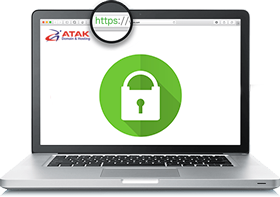Wildcard SSL
Protect your domain name and all subdomains with Wildcard SSL single certificate!
- Free Support

Wildcard SSL SSL Certificates
Wildcard SSL Certificates

- Wildcard SSL Certificate prevents you from getting separate SSL certificate for each domain and saves money.
- Since more than one domain - subdomain is managed with the same SSL, you use time optimally.
- With Wildcard SSL, your domain name named domainname.com; You also protect subdomains such as your login.domainaddress.com and pay.domainaddress.com.
- Easy certificate management.
- Cheapest price, unlimited subdomains - subdomain security, multiple server flexibility.
The main function of the Wildcard SSL certificate is to maintain the communication between the server and the user securely. Identities, passwords, credit card numbers, etc. Protect your sensitive data.
Provide high level protection with 128/256 Bit encryption. Verification of company information will increase your trust and your sales will increase with confidence index.
It is very easy to purchase Wildcard SSL and define it on your website. You can secure your website within minutes by approving the link to the domain's mail address.
Wildcard SSL certificate security fees are very high. Warranty fees vary according to the Wildcard SSL certificate brand. It pays you a high warranty fee in case you experience problems due to certification.
We provide free technical support for documents required for Wildcard SSL. For Wildcard SSL installation, our SSL technical support experts can define your SSL certificate for you.
The Wildcard SSL secure site seal on your website gives your site confidence. The site seal shows the assurance of the SSL brand providing the certificate to the site.
 What is Wildcard SSL Certificate In computer networks, the Wildcard SSL certificate is a public SSL certificate that can be used with multiple subdomains of a domain. Its main purpose is to secure websites with HTTPS, but its main feature includes subdoman (subdomains) names. Compared to regular SSL certificates, it is cheaper and more useful than a certificate for each subdomain. This further simplifies complexity and lowers costs by securing subdomains.
What is Wildcard SSL Certificate In computer networks, the Wildcard SSL certificate is a public SSL certificate that can be used with multiple subdomains of a domain. Its main purpose is to secure websites with HTTPS, but its main feature includes subdoman (subdomains) names. Compared to regular SSL certificates, it is cheaper and more useful than a certificate for each subdomain. This further simplifies complexity and lowers costs by securing subdomains.Wildcard SSL certificates are categorized on the basis of verification level, number of domains and number of servers that can be used together. Similarly, when we categorize according to the verification level, they are called DV (domain validation) Wildcard, OV (organization validation) Wildcard and EV (extended validation) Wildcard certificate. Multi-domain wildcard certificates and Multi-server wildcard certificates are issued according to the domain name and the number of servers.
There are similarities and differences between Wildcard SSL and standard SSL certificates. HTTPS is now required. It is shown as a requirement by all web browsers. To serve your site via HTTPS, you need to install an SSL certificate on your server. Next, you need to configure all logins through your web server to make HTTPS connections. Wildcard SSL certificate saves you a great cost. It provides the same industry standard encryption strength as a regular SSL certificate. Both come with 2048 bit RSA signature keys as standard. It makes it easy to encrypt up to 256 bits.
Wildcard SSL certificate technically only one subdomain match is supported according to RFC 2818. It is not possible to get wildcards for EV (Extended Validation) certificates. Wildcard SSL can be added to multi-domain certificates or with UCC type certificates.

Typically, an SSL certificate protects only one domain address. You cannot use the SSL certificate you received for xyz.com for example.xyz.com.
It secures the subdomain addresses under the main domain with the Wildcard SSL certificate.
Let's give an example:
mail.domain.com
login.domain.com
dev.domain.com
These are all first-order subdomain examples. All can be secured with the same Wildcard. Unlimited. So there is no subdomain limit. But there is a difference.
example.mail.domain.com
login.member.domain.com
You will need an additional Wildcard SSL for second-level subdomains such as.
When generating a CSR for your Wildcard certificate, enter your domain as * .domain.com.
The next step to purchasing a Wildcard SSL certificate is to create a certificate signing request (CSR) with the asterisk in front of your domain name (for example * .xyz.com). The certification authority (CA) will then issue an SSL certificate and you can use it for all your primary subdomain addresses. Your protected domains will be sent to you via e-mail.
- The ideal approach to secure subdomains is to use a Wildcard SSL Certificate. These SSL certificates offer the use of public key authentication that can be used with multiple subdomains. Easy to manage, you can manage all your subdomain addresses from a single point, or you can easily include a subdomain address to be added later. Purchasing multiple SSL Certificates for each subdomain offers you a costly and difficult to manage functionality. However, your company can protect all subdomain addresses using a Wildcard SSL Certificate.
- Wildcard SSL certificates are easy to manage as you will only have one SSL Certificate for all your subdomains and they will all have the same renewal date.
- If you have secondary subdomain addresses that you want to secure (such as https://test.mail.abc.com) then you will need to purchase a separate SSL. A certificate is required for every 2nd level subdomain. The other option is to purchase a UCC / SAN SSL Certificate. It allows you to secure your secondary level subdomain addresses as well. However, their cost is slightly higher.
- Wildcard SSL Certificate has DV and OV type verification. You can safely host unlimited subdomains. It gives a static / dynamic seal of trust. It is produced and installed within minutes. Save money and administration time. Over 99% browser compatible. There is a warranty fee of up to 2M USD.
- A "regular" SSL certificate provides encryption for a domain. In addition, single-domain SSL certificates are also available in three validation levels, including EV. On the other hand, Wildcards protect websites with multiple subdomains. When you create your certificate signing request during the purchase, simply put an asterisk at the domain level you want to encrypt.
- The disadvantage of Wildcard SSL certificate is that if the certificate needs to be revoked in one subdomain domain, it must be revoked in others. So if there is a security breach for login.abc.com, which we have given in the example, this may put other subdomain names in danger. Buying separate certificates is more costly and may require more administration, but it ensures that each subdomain is protected separately.

You can order a Wildcard SSL right away from Atak Domain to take advantage of our warranty fee up to US $ 1.75 million, secure access without www and www, free secure site seal, free expert support.
Our inexpensive Wildcard SSL certificates have a standard x.509 digital signature and are suitable for most desktop and mobile browsers. Depending on the certificate provider you choose, you will have some additional features such as ECC encryption, unlimited server license, daily malware scanning, vulnerabilities assessment, security seal search and page loading speed.
 Differences between Wildcard SSL and Normal SSL When using web-based services on the Internet, SSL / TLS certificates have become a standard for authentication and security. Varies depending on how SSL certificates are used and their purpose, multi-use certificates provide more flexibility than traditional certificates. Multiple domain SSL certificates protect multiple FQDN (fully qualified domain addresses) and subdomain addresses, reducing your administration costs and simplifying certificate setup, management and deployment.
Differences between Wildcard SSL and Normal SSL When using web-based services on the Internet, SSL / TLS certificates have become a standard for authentication and security. Varies depending on how SSL certificates are used and their purpose, multi-use certificates provide more flexibility than traditional certificates. Multiple domain SSL certificates protect multiple FQDN (fully qualified domain addresses) and subdomain addresses, reducing your administration costs and simplifying certificate setup, management and deployment.One of the featured multi-use SSL certificates are Wildcard SSL Certificates. It helps secure your domain name and all primary subdomain addresses running under it, saving time and money. SSL Wildcard certificates allow you to simplify SSL management processes. It provides cost savings compared to individual certificate purchases. It allows you to secure multiple subdomains under a single FQDN (main domain). Wildcard certificates provide instant protection to your existing and future subdomain addresses while reducing your management costs. Wildcard SSL certificates do not contain specific service names and always contain a wildcard (shown as *) in front of the domain address. Wildcard certificate is more flexible than using multiple single purpose certificates.
Wildcard SSL certificates have significant gains. It helps establish all important security requirements to the main domain and the second-level domain name. When installed on a specific e-commerce site, it triggers the green HTTPS signal on second-level domains. In a few minutes, you can have a single certificate on multiple servers with the current setup. It is widely preferred by e-commerce websites. Because it offers a one-stop solution for its security.
The Wildcard SSL certificate works the same as the regular SSL certificate, but since it is a wildcard certificate it takes special care when generating a Certificate Signing Request (CSR). When generating CSR for wildcard SSL, users must add a common name in a specific format. The Wildcard SSL common name is indicated by an asterisk. If your certificate is "Multi Domain Wildcard SSL", we recommend using the common name without "*" in CSR. Multi domain feature makes a difference.
Wildcard SSL Certificate Question - Answer
Payment Terms
Get in touch with our experienced sales team
Discuss becoming a domain reseller!












